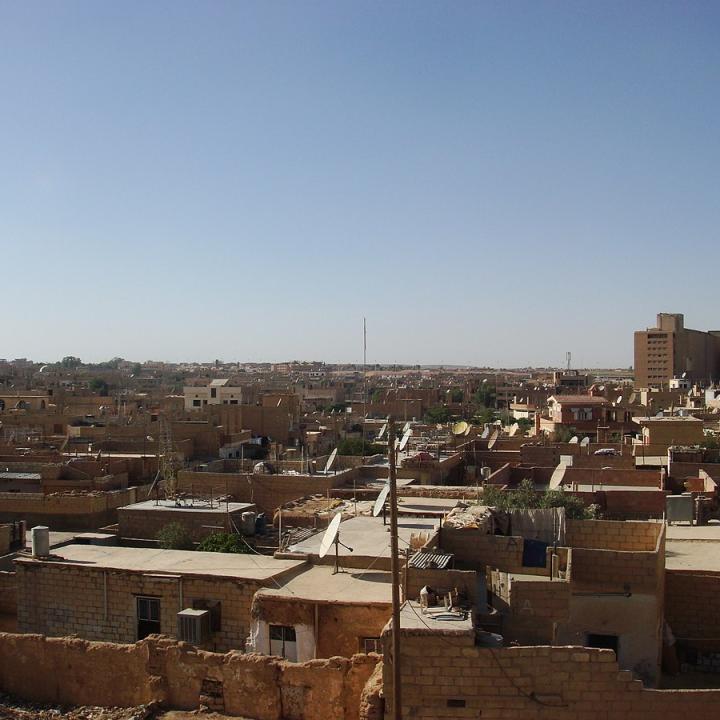
- Policy Analysis
- Fikra Forum
Hasaka Residents Worry with ISIS Fugitives from al-Sinaa Prison Still Loose

Despite the January 26 announcement by the Syrian Democratic Forces (SDF) that they had taken full control of al-Sinaa prison in Hasaka, the security situation in this northeastern city is still not completely stable.
Over two months later, the city’s residents are particularly concerned—especially those living in neighborhoods close to the prison. Residents of the city’s southern areas such as Ghweiran—specifically eastern Ghweiran—do not feel safe or comfortable in their neighborhoods. Aside from concerns that the prison is still located in their area, some ISIS members remain on the lose after ISIS-affiliated groups attacked al-Sinaa, located in the southern part of the city, on January 20.
What particularly alarms residents is that, despite the SDF periodically searching residences for those who remain outside of the prison, SDF forces have observed some fugitive ISIS members hiding in civilian homes in Hasaka neighborhoods further from the prison. Many fugitive ISIS members sought safety in the city’s southern neighborhoods, thinking they would act as a support base. When a security clash between SDF forces and ISIS members takes place, the people of these neighborhoods remain trapped, trembling from the horror of the event and the sounds of artillery and clashes. Children and the elderly are not used to such events after more than three years of absolute calm and safety in the city. Now, residents in those areas expect the appearance of any escaped prisoner in the vicinity to turn the area into a battlefield, with no idea of when it will end or what its consequences will be.
Even so, the terror that ISIS members instill in the population has not dissuaded them from confronting them and thwarting their plans. Most residents of those Arab-majority neighborhoods have helped the SDF find the fugitives as soon as possible in the hopes that security will come back to their areas, they will not turn into conflict zones, and that normal life will return. One resident, Suleiman Muhammad, says: “We are trying hard for this war, which has displaced and killed many, to end as soon as possible. We guard the neighborhood day and night, and as soon as we see a person with an unfamiliar face or strange movement, we inform the relevant authorities. In turn, they—even if they prolong the response due to fear that we could be ISIS collaborators—respond, encircle the area, and eliminate them.”
Almost everyone I met in the neighborhood of Ghweiran is upfront about their fear that the fugitives have been able to escape without being found quickly. ISIS members on the loose naturally means that a danger looms for local citizens. Some fear that they will perform suicide attacks, causing harm to the general public.
This public fear extends to all the neighborhoods of Hasaka as well as nearby cities throughout northeastern Syria, including the organization’s former declared capital. A friend who lives in Raqqa city described the mood there: “We are concerned about those fugitives reaching us. Raqqa has had its fill of death, horror, and a life that resembles everything but life during the control of the so-called ‘Islamic State’ over the area for many years.” This is likewise the case in my city of Amuda. As another friend explained, “I can no longer go out after sunset. I expect to find an ISIS fugitive here, turning my life to hell, taking me captive or killing me because I don’t wear the hijab and am considered an infidel by them.”
The attack on the prison and subsequent escape of ISIS members continues to impact the residents of Hasaka, its countryside, and surroundings. The threat is especially severe for those who live in the southern areas, who told me that they are afraid that things will go back to how they were before the al-Sinaa incident that turned their lives upside down. This situation is a devastating reversal for citizens in northern and eastern Syria who have experienced stability—at least in terms of security—for years. Life had to some extent returned to normal, and social customs that residents of those areas had known for decades and had been interrupted by the war returned, and the feeling that traveling late at night was safe had become almost normal. The sudden and unexpected shift in events has therefore been devastating psychologically, wiping out the remaining dreams of Syrians for normalcy and safety in daily life.


